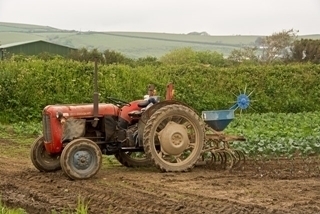“As the UK breaks away from the European Union’s Common Agricultural Policy (CAP), the region’s network of predominantly small, family-run farms are ‘particularly vulnerable’ to the financial impact of this major shift in domestic policy.”
With farming being a significant driver for the region’s economy, the predicted impact on the sector’s supply chains, producers, suppliers, business owners and workers is widespread.
.
Farmers are facing a lot of issues at the moment, with many of them asking a few questions a month ago, following the Spring Statement:
Is the Ministry of Agriculture “living in a parallel universe”? Do ministers have “no understanding of how food production works”?
Of farming – trade deals, standards, workers and subsidies – Vision Group for Sidmouth
They are asking more questions on exactly the same issues, following a report just out:
This report provides insights into the transition from the Basic Payment Scheme (BPS) to the new Environmental Land Management schemes (ELMs). The report reveals the impact the transition is likely to have on the farming community, supply chain, jobs, producers, suppliers, business owners, workers, and the wider rural economy.
Rural Economy – Heart of the south west LEP
With the full piece here:
And there has been a fair amount of commentary in the local and farming press.
The Western Morning News this morning, there were fears for the viability of small family-run farms:

More than £800 million could be lost from the South West’s rural economy over the next five years as farm subsidy payments are withdrawn post-Brexit, according to a new report. As the UK breaks away from the European Union’s Common Agricultural Policy (CAP), the Great South West Partnership (GSWP) says that the region’s network of predominantly small, family-run farms are “particularly vulnerable” to the financial impact of this major shift in domestic policy.
Its report, ‘Assessing the Impact of Agricultural Transition in Cornwall and the Isles of Scilly, Devon, Dorset and Somerset’, reveals how Basic Payment Scheme (BPS) reductions are likely to be felt across the South West on a yearly basis and over a ten-year timescale, from 2020 to 2030. The move to phase out subsidies, taking place over a seven-year transition period from 2021 to 2027, comes as many farmers and growers are having to cope with soaring costs for inputs such as animal feed, fertiliser and fuel.
Researchers from the Countryside and Community Research Institute (CCRI) at the University of Gloucestershire were commissioned by the GSWP to carry out the study. It highlighted how the Sustainable Farming Incentive (SFI) – the first of three new Environmental Land Management (ELM) schemes – has had an “uncertain start” in the region, with increasing concerns over payment rates and the pilot “only just” securing the thousand or so farms anticipated by the Department for Environment, Food and Rural Affairs (Defra). With up to £440m less to spend on materials and services, the report warns there will be a “significant knock-on” for local jobs and businesses.
PressReader.com – Digital Newspaper & Magazine Subscriptions
Farmers’ Weekly reiterated these concerns:
Research published by the Countryside and Community Research Institute (CCRI) predicts that £883m will be lost from the rural economy up to 2027 across Cornwall, Devon, Dorset, the Isles of Scilly and Somerset.
The introduction of the post-Brexit Environmental Land Management (ELM) schemes will coincide with the phased removal of the Basic Payment Scheme (BPS), which provided millions of pounds in direct support to farmers and landowners while the UK was a member of the EU. Defra is introducing the first component of ELM this year, the Sustainable Farming Incentive (SFI), but the support package is expected to be much smaller overall. With other ELM schemes’ funding still in development, the wider impact on the rural economy remains uncertain.
The South West’s rural economy, which is dependent on small, family-run farms, is particularly vulnerable to the financial impact of the transition. With farming being a significant driver for the region’s economy, the predicted impact on the sector’s supply chains, producers, suppliers, business owners and workers is widespread.
Loss of BPS will cost South West economy £883m, report finds – Farmers Weekly
Finally, Tim Lang, writing in the New Statesman, warns about the political ramifactions:
Agri-food policy, so often bubbling away at the political margins, is now taking centre stage. The cost-of-living crisis, the war in Ukraine, obesity, food banks, concerns about national security and Brexit hold-ups at ports all lead to questions about how and what we eat. The response from government to each of these problems is a case study in food policy incompetence.
Support for Brexit drew on years of pillorying EU food policies, but the Tories failed to work out what exactly it wanted after leaving the EU. It is all very well to hope for trade deals with former colonies, but most food and drink imports to the UK come from continental Europe – with 39 per cent of total imports arriving from the Netherlands, Ireland, Germany and France alone. And while the government dreams, self-sufficiency drops: in 2020, 46 per cent of food consumed in the UK was imported.
The Agriculture Act 2020, post-Brexit England’s flagship farming legislation, barely mentions food. EU subsidies worth £3.5bn a year kept British farming afloat. Post-Brexit subsidies will focus solely on environmental land management schemes to allow for the return of nature, not the growing of food.
These changes mean land politics are creeping back, and there are signs the Conservatives may pay an electoral price for that. Owen Paterson’s old North Shropshire constituency fell to the Liberal Democrats last autumn, and it would be no surprise if the former MP Neil Parish’s Devon stronghold goes the same way after his resignation this month. There is rural discontent.
Wrong-headed food policies will lose the Tories their rural voters – New Statesman